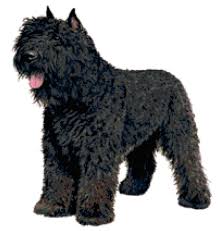
Bouvier des Flandres
Conditions of detention
Bouviers thrive in homes with plenty of space to exercise, such as rural or suburban settings. They require regular physical activity and mental stimulation to prevent boredom and destructive behaviors.
Useful Fact: Bouviers are excellent watchdogs due to their protective nature and strong loyalty to their families.
Nutrition and diet
A balanced diet is crucial for maintaining the health and vitality of the Bouvier des Flandres. High-quality commercial dog food or a well-formulated homemade diet should meet their nutritional requirements.
Useful Fact: Because Bouviers are prone to obesity, it’s important to monitor their calorie intake and ensure they get enough exercise.
Health
Bouviers are generally healthy but can be prone to certain genetic conditions such as hip dysplasia, elbow dysplasia, and eye problems. Regular veterinary check-ups are essential.
Useful Fact: Regular exercise and maintaining a healthy weight can help reduce the risk of joint-related issues.
Grooming and care
The Bouvier des Flandres has a thick, double coat that requires regular grooming. Weekly brushing and occasional trimming are necessary to keep their coat in good condition and prevent matting.
Useful Fact: Despite their dense coat, Bouviers are considered hypoallergenic and may be suitable for people with allergies.
Education and training
Bouviers are intelligent and eager to please, making them highly trainable. They respond best to positive reinforcement techniques and consistent, early training.
Useful Fact: Socialization is crucial for Bouviers to ensure they are well-adjusted and can interact positively with other animals and people.
Toys and entertainment
Bouviers enjoy a variety of toys, especially those that challenge their intelligence and keep them physically active. Puzzle toys, interactive toys, and durable chew toys are great options.
Useful Fact: Engaging in activities like agility, obedience, and herding trials can provide excellent mental and physical stimulation for Bouviers.
Safety
Bouviers should be kept in a secure environment with a fenced yard to prevent them from wandering. They should also be supervised around small animals due to their herding instincts.
Useful Fact: Their protective nature makes them excellent watchdogs, but proper training is necessary to ensure they can distinguish between real threats and normal social interactions.
Accessories
Essential accessories for Bouviers include sturdy collars and leashes, harnesses for walks, and grooming tools like brushes and combs.
Useful Fact: Using a harness instead of a collar can help prevent strain on their neck during walks, especially if they tend to pull.
Socialization
Early and consistent socialization is important for Bouviers to ensure they develop into well-rounded adults. Exposure to different people, environments, and other animals helps them become more adaptable.
Useful Fact: Well-socialized Bouviers tend to be more confident and less prone to anxiety in new situations.
Travel and Transportation
Bouviers can be good travel companions if properly trained and accustomed to travel from a young age. They should be secured in a vehicle using a seatbelt harness or a crate and have regular breaks during long journeys.
Useful Fact: Ensuring your Bouvier des Flandres is comfortable with travel can make vacations and trips to the vet much less stressful.
Behavior and psychology
Bouviers are loyal, protective, and affectionate with their families. They have a strong work ethic and enjoy being active. However, their herding instincts can sometimes manifest as dominant or stubborn behavior.
Useful Fact: Regular mental and physical stimulation helps prevent boredom and the development of unwanted behaviors in Bouviers.
Legal aspects
Owners should be aware of local regulations regarding dog ownership, including licensing, leash laws, and any breed-specific legislation that may apply.
Useful Fact: Responsible ownership includes ensuring that your Bouvier is properly identified with tags and a microchip, which can be crucial in case they ever get lost.


